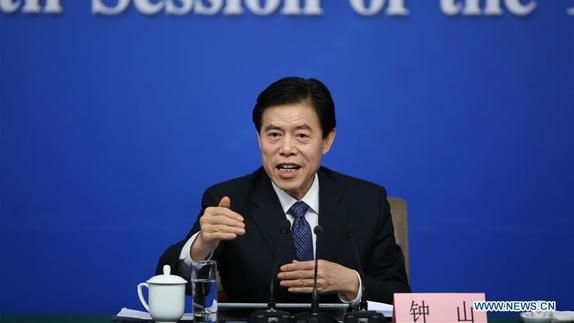 Chinese Minister of Commerce Zhong Shan answers questions at a press conference on structural adjustments and innovation for the fifth session of the 12th National People's Congress in Beijing, capital of China, March 11, 2017. (JIN LIWANG / XINHUA)
Chinese Minister of Commerce Zhong Shan answers questions at a press conference on structural adjustments and innovation for the fifth session of the 12th National People's Congress in Beijing, capital of China, March 11, 2017. (JIN LIWANG / XINHUA)
BEIJING / HANOI- Members of the Association of Southeast Asian Nations (ASEAN), China, Japan and the Republic of Korea (ASEAN Plus Three or APT) should strengthen cooperation in combating COVID-19 and promoting economic development, Minister of Commerce Zhong Shan said Thursday.
The economic ministers of China, ASEAN, Japan and South Korea on Thursday and also reaffirmed the importance of open markets amid the COVID-19 pandemic and the need for efforts against the epidemic's adverse impact
The economic ministers of China, ASEAN, Japan and South Korea on Thursday and also reaffirmed the importance of open markets amid the COVID-19 pandemic and the need for efforts against the epidemic's adverse impact.
The economic ministers held an online meeting on Thursday, chaired by Vietnamese Minister of Industry and Trade Tran Tuan Anh, and adopted the ASEAN Plus Three Economic Ministers' Joint Statement on Mitigating the Economic Impact of the COVID-19 Pandemic.
ALSO READ: China's foreign trade to regain momentum in H2
Zhong said China is willing to share anti-epidemic experiences with countries in the region and will continue to support their commercial purchase of medical supplies in China.
Countries in the region should step up trade and investment cooperation, stabilize and enhance regional industrial and supply chains and maintain smooth flow of people and logistics to mitigate the impact of COVID-19 and restore regional economic growth at an early date, Zhong said.
He also called on the countries to deepen regional economic integration and implement the consensus of the special summit of ASEAN Plus Three held in April on striving to sign the Regional Comprehensive Economic Partnership this year.
ALSO READ: China's outbound investments to BRI, ASEAN countries jump
The parties agreed that deepening anti-epidemic and economic cooperation is of great importance to promoting regional economic integration and joint efforts should be taken to fight against the disease, stabilize regional industrial and supply chains and preserve a free, stable and fair trade and investment environment.
It was also agreed that the parties should keep markets open, safeguard multilateral trade system, and enhance collaboration in trade and investment.
The meeting was chaired by Vietnam, which holds the ASEAN presidency. After the meeting, a statement on mitigating the impact of COVID-19 on economy was issued.
Open Markets
In thier joint statement, the ministers acknowledged that there is an "urgent need" for intensified and concerted efforts to address the adverse impact of the COVID-19 pandemic on their people, including "economic disruptions that have affected regional supply chains, the financial markets and human capital."
The ministers reaffirmed the importance of keeping the markets open for trade and investment to strengthen the resiliency and sustainability of regional supply chains and maintain necessary flow of goods and services.
They agreed to refrain from taking unnecessary measures that may affect the smooth flow of essential goods such as food, commodities, medicines and medical supplies in the region, and to continue to address non-tariff barriers, especially those impeding the smooth flow of goods and services.
They encourage close coordination, especially among the customs agencies, to continue promoting trade facilitation measures, especially at land borders, according to the statement.
READ MORE: ASEAN to gain from China’s recovery
Noting the importance of facilitating essential movement of business people across borders, the ministers encourage their governments to establish relevant guidelines that would allow essential cross-border travel without undermining anti-epidemic efforts.
According to the statement, the ministers agree to support businesses, particularly the micro, small and medium enterprises and the vulnerable economic sectors, and welcome knowledge sharing and exchanges of best practices on policies and programs to manage the pandemic's adverse effects on economic activities.
They also welcome efforts to effectively utilize the ASEAN Plus Three Emergency Rice Reserve to overcome possible food shortages and help ensure food security in the region during emergencies, said the statement.
The ministers agree to identify and pursue initiatives to strengthen joint efforts toward post-pandemic recovery in the region, and to jointly restore economic growth by enhancing regional trade and economic cooperation through a series of measures, including addressing trade barriers, promoting trade and investment, and expanding fields of cooperation.
They also remain committed to the signing of the Regional Comprehensive Economic Partnership (RCEP), a proposed free trade agreement (FTA) between the 10 ASEAN member states and their six FTA partners -- China, Japan, South Korea, Australia, New Zealand and India, in 2020, according to the statement.
ASEAN, which was founded in 1967, groups Brunei, Cambodia, Indonesia, Laos, Malaysia, Myanmar, the Philippines, Singapore, Thailand and Vietnam.


